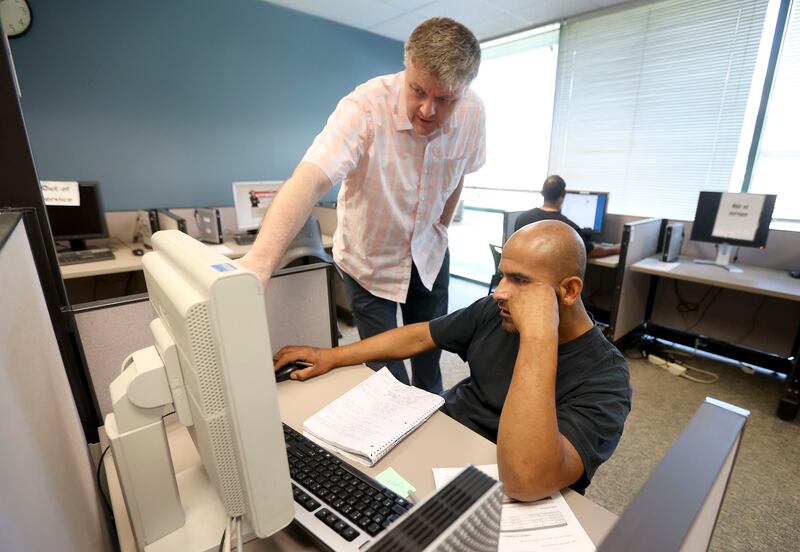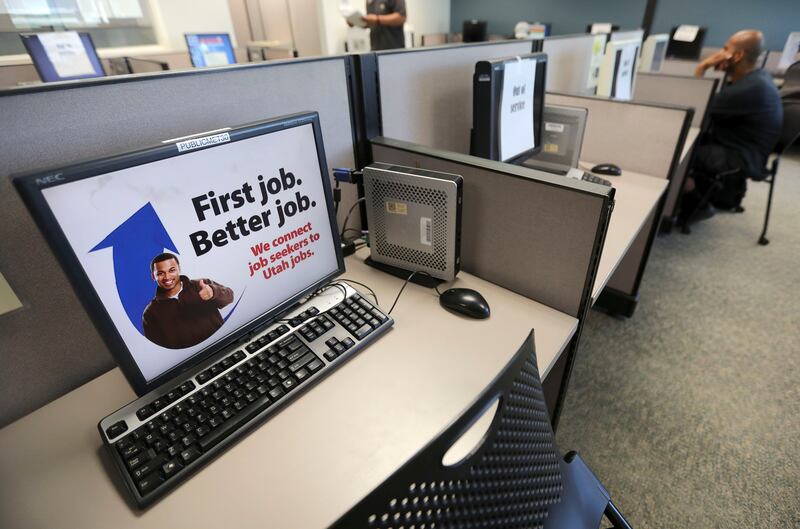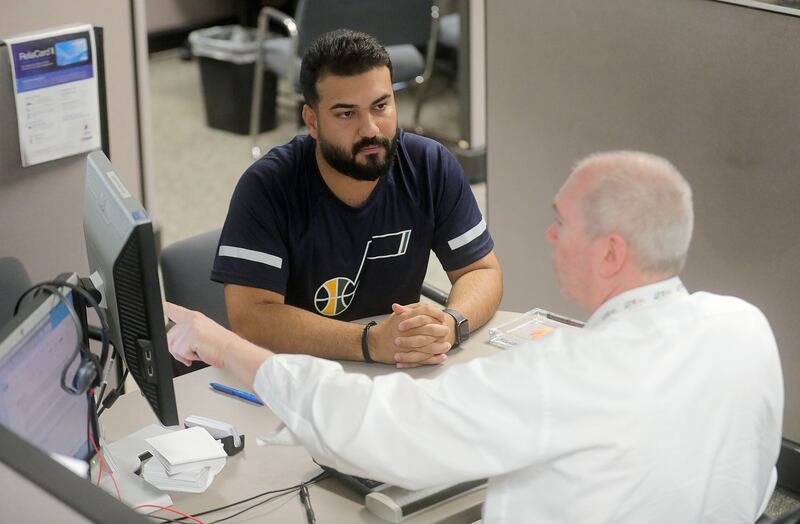Is Utah’s economy, and tens of thousands of still unemployed workers, ready for a change on Saturday that comes with a $50 million-a-month price tag?
Utah Gov. Spencer Cox said his decision to end pandemic related federal jobless benefits to some 24,000 Utahns two months ahead of the deadline is the right call amid the state’s rising employment and robust recovery from the impacts of COVID-19.
But some say they are facing ongoing challenges in finding work even as the state’s unemployment rate drops to a nation-leading 2.7% and employers advertise 70,000 current job openings. A southern Utah resident recently wrote the governor describing the hardship he and his wife are facing as she struggles to find work after losing her job during the pandemic.
“It’s affecting us personally,” said Barry Brumfield, of St. George.
Governor sets reason for cutoff
“This is the natural next step in getting the state and people’s lives back to normal,” Cox said in May when announcing the move. “I believe in the value of work. With the nation’s lowest unemployment rate ... and plenty of good-paying jobs available today, it makes sense to transition away from these extra benefits that were never intended to be permanent.
“The market should not be competing with government for workers.”
He also noted other “safety net programs” such as assistance with rent, utility, food and medical bills will still be available.

Cox is among some two dozen Republican state governors across the U.S. who have made similar decisions about ending federal pandemic benefits early, saying the added benefit is keeping people from wanting to work.
Labor experts say the shortage is not just about the $300 payment. Some unemployed people also have been reluctant to look for work because they fear catching the virus. Others have found new occupations rather than return to their old jobs. And many women, especially working mothers, have had to leave the workforce to care for children.
Following Cox’s announcement, Utah House Minority Leader Brian King, D-Salt Lake City, pointed to those factors while expressing his frustration with the governor’s decision to end the benefits in Utah.
“I mean, this is the perfect example of a disconnect between people in regular lives and people who are struggling to get back on their feet,” King said. “There are many, many people who are concerned — afraid — about returning to the workplace.”
What “frustrates me the most,” King said, is Cox’s decision “reflects this thinking of many on the other side of the aisle that people don’t want to work. That’s fundamentally wrong.”
As of early June, the Utah Department of Workforce Services reports that just over 24,700 residents were drawing some type of unemployment benefits with about 12,000 getting traditional benefits plus the federally funded $300 per week pandemic stipend. Another 11,000 or so were still getting unemployment insurance benefits under federal extensions also created to blunt COVID-19 economic impacts on U.S workers. And about 1,200 Utah gig workers — people employed by companies like Uber, Lyft, GrubHub and others that are classified as contractors who are exempt from typical unemployment benefits — have also been receiving benefits under federal emergency mandates. While federal deadlines for most pandemic-related benefits for unemployed workers are set to expire in early September, Cox’s order brings them to a halt 10 weeks ahead of schedule.
And that’s a decision that’s creating concern for Barry and Stacey Brumfield.

One family’s experience
In a Deseret News interview, Barry Brumfield said he is a lifelong Republican who also voted for Cox in Utah’s 2020 gubernatorial election but felt the governor’s decision on curtailing federal pandemic benefits early was a bad call.
“We’re very unhappy with this decision,” Brumfield said. “We really believe in individual rights and benefitting by your own hard labors, but we’ve gotten to the point where it feels like our hard labors have been lost.
“We support the other things (Cox) is doing but this is our one argument because it’s affecting us personally.”
Brumfield, who is retired, said his wife lost her 13-year position with SkyWest last year as the airline travel industry was brought to a near standstill by the pandemic. While Stacey Brumfield continues to seek work, Barry Brumfield said the only offers she’s had so far are for minimum wage jobs and that, at 63, she’s not in a position to start over on a new career path.
In a letter to Cox, Barry Brumfield wrote that his wife’s job hunting experiences have led her to believe that employers in their area are looking for younger prospects.
“Governor, you may think you are doing what is best for your constituents, but my wife and I are among those who will be greatly affected and hurt by your decision,” Brumfield wrote. “My wife’s employment is ‘critical’ to our being able to pay the bills and stay out of poverty.
“However, my wife, who had a position working in the airline industry for 13 years, lost her job due to the pandemic and the drastic drop in airline business. Now she is on state and federal unemployment which is vital to us. She is 63 years old, and has been seeking employment since the pandemic began. Her attempts to find employment have been futile due to her age!!! Businesses want someone younger!!” the letter says.
The Brumfields are not alone among Utahns who find themselves both late in their careers and currently seeking jobs. As of June 17, the Department of Workforce Services reports 13% of those currently unemployed are 60 years or older.
But the majority — 68% — of those who will be impacted by the suspension of federal pandemic benefits are in the “prime working age” category of 25 to 54 years old.
And that’s a statistic that some economists say bodes well for Utah’s overall economy, which continues to outperform the rest of the country.
Utah can absorb the loss of federal aid
Phil Dean, former state budget director and current public finance senior research fellow with the University of Utah’s Kem C. Gardner Policy Institute, said Utah’s economy is well situated to absorb the $50 million that will be lost in the suspension of federal pandemic benefits.
“I just think we’re at a point in the economic recovery where it really does makes sense to do it,” Dean said. “In aggregate, elimination of the benefits will have a negligible impact on the economy ... though it remains the case that certain pockets are recovering more slowly than others and some households will feel these changes.”
Dean said it’s important to remember that the standard unemployment insurance benefit programs will remain in place and those unable to find a job will still have access to the standard claims process.
He said that while the programs launched by the federal government to mitigate the worst of the COVID-19 economic impacts on individuals and families was the right response at the time, current circumstances no longer require the additional benefits.
“The scope of the challenge we had in the midst of the pandemic as well as the government’s involvement in restricting the private sector made the initial response entirely appropriate,” Dean said. “And it is entirely appropriate now to pull back those enhanced benefits and go back to the traditional programs and system.”
During a virtual Facebook town hall event on June 15, Cox reiterated his belief that his decision to end pandemic-related benefit extensions and stipends was the right economic call and highlighted efforts to channel additional funding to worker retraining programs.
Cox said the state has dedicated $16.5 million to help more than 5,700 individuals get training and find better employment opportunities through the Learn and Work program. He also noted in a press release that the state has committed an additional $15 million that will be awarded to training institutions throughout Utah to help those who want to upgrade their skills to enhance employment opportunities.
Further information on job retraining opportunities can be found at jobs.utah.gov/jobseeker/career/index.html and inutah.org/learn-work.
Correction: An earlier version incorrectly indicated the end of pandemic-related federal unemployment extensions and stipends for Utah workers would result in a $50 million loss. The changes will result in losses of approximately $50 million per month.


